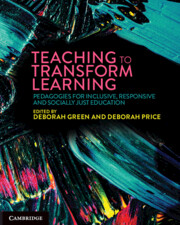Book contents
- Teaching to Transform Learning
- Acknowledgement of Country
- Teaching to Transform Learning
- Copyright page
- Contents
- Contributors
- Acknowledgements
- Introduction Understanding the learner to inform educators’ implementation of pedagogical approaches to transform learning
- Part 1 Pedagogies for all
- 1 Aboriginal pedagogies: exploring Indigenous ways of knowing, being and doing
- 2 Making lifeworld connections through critical pedagogies
- 3 Culturally responsive pedagogies: learners as assets
- 4 Traversing identities: navigating the self, school and system for culturally responsive pedagogies
- 5 Culturally and religiously responsive pedagogy: a case study of enabling pedagogy for superdiverse Australian classrooms
- 6 Enabling pedagogy and critical teaching approaches in diverse learning contexts
- 7 Pedagogy of hospitality
- Part 2 Engaging pedagogies: making the curriculum come alive for all learners
- Part 3 Empowering pedagogies: 21st-century skill development and 22nd-century futures thinking
- Index
- References
7 - Pedagogy of hospitality
from Part 1 - Pedagogies for all
Published online by Cambridge University Press: 25 October 2024
- Teaching to Transform Learning
- Acknowledgement of Country
- Teaching to Transform Learning
- Copyright page
- Contents
- Contributors
- Acknowledgements
- Introduction Understanding the learner to inform educators’ implementation of pedagogical approaches to transform learning
- Part 1 Pedagogies for all
- 1 Aboriginal pedagogies: exploring Indigenous ways of knowing, being and doing
- 2 Making lifeworld connections through critical pedagogies
- 3 Culturally responsive pedagogies: learners as assets
- 4 Traversing identities: navigating the self, school and system for culturally responsive pedagogies
- 5 Culturally and religiously responsive pedagogy: a case study of enabling pedagogy for superdiverse Australian classrooms
- 6 Enabling pedagogy and critical teaching approaches in diverse learning contexts
- 7 Pedagogy of hospitality
- Part 2 Engaging pedagogies: making the curriculum come alive for all learners
- Part 3 Empowering pedagogies: 21st-century skill development and 22nd-century futures thinking
- Index
- References
Summary
Education continues to primarily focus on educator-directed traditional transactions of pre-determined knowledge and skills not necessarily equally accessible or transformational for all learners (Smith, 2018). In contrast, deeper learning required for transformation requires pedagogies that facilitate contextualised understandings of shared meanings. Optimal transformational learning requires thoughtful development of the self as an educator, deliberate planning of safe learning environments and pedagogical practice that enables critical thinking. A pedagogy of hospitality provides a relational and safe space, but also an intentionally welcoming and critical learning space that holistically nurtures learners. Pohl (1999) identifies that hospitality is not charity but shared humanity as pedagogy; hospitality is a form of justice that facilitates meaningful learning.
Five key outcomes of pedagogy as hospitality are discussed in this chapter: love; formation and transformation; intentional nurture; critical empowerment; and hope and justice.
Keywords
- Type
- Chapter
- Information
- Teaching to Transform LearningPedagogies for Inclusive, Responsive and Socially Just Education, pp. 105 - 120Publisher: Cambridge University PressPrint publication year: 2024

